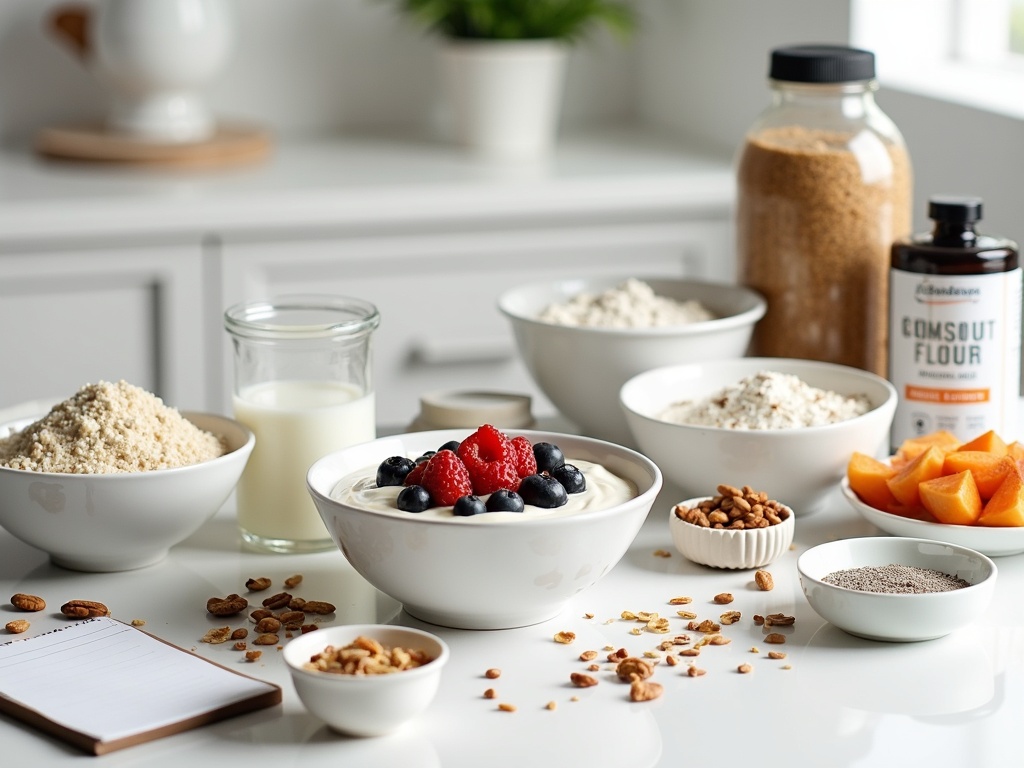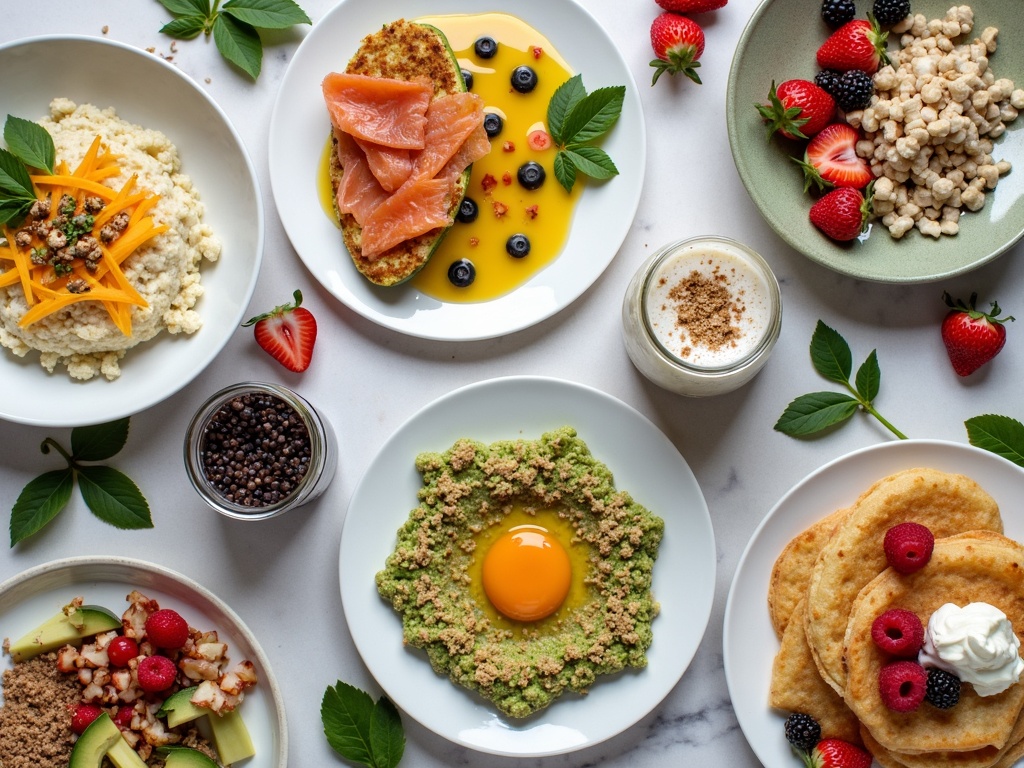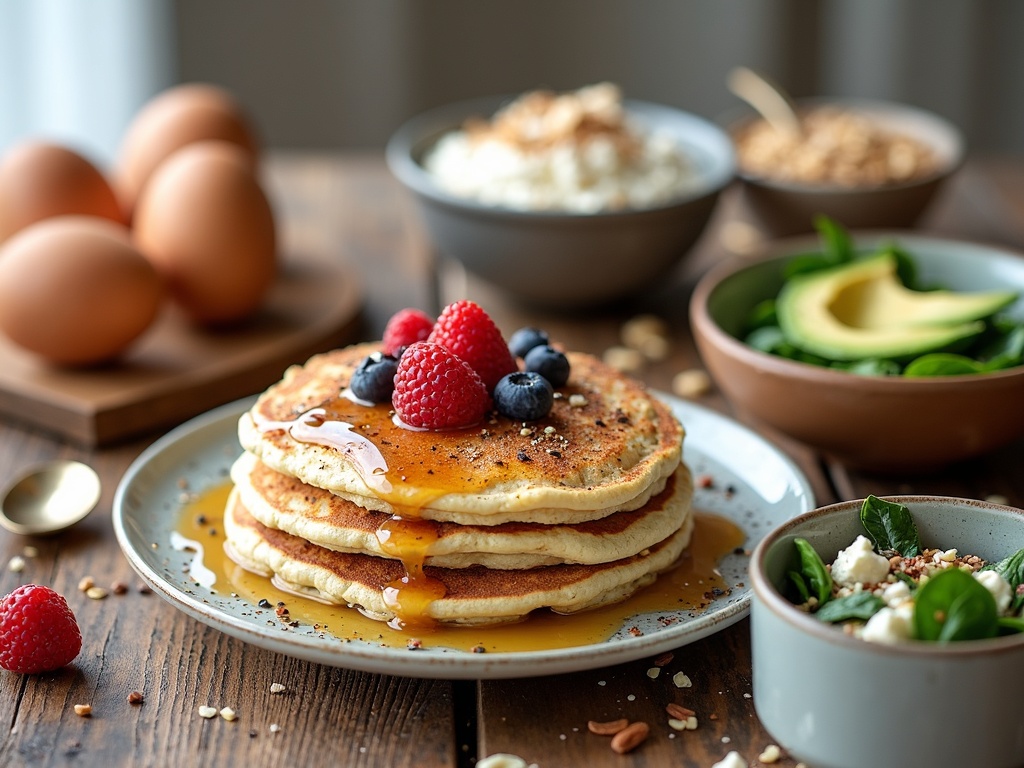The keto diet, traditionally heavy on eggs for breakfast, is evolving as approximately 30% of Americans seek egg alternatives due to allergies, dietary preferences, or simply to combat the meal fatigue that affects one in five keto dieters within weeks. This shift has sparked creativity in the low-carb breakfast space, with innovative options like coconut flour pancakes, chia seed puddings, and avocado-based dishes maintaining the high-fat, low-carb ratios necessary for ketosis.
Find In This Article
Key Takeaways
- Almond flour, coconut flour, ground flaxseed, and chia seeds serve as excellent binding agents for egg-free keto recipes with minimal carbs.
- Unsweetened plant milks, MCT oil, and keto-friendly sweeteners like erythritol and stevia provide the foundation for delicious egg-free breakfasts.
- Precision in measurements and ingredient selection is crucial for successful keto cooking, particularly when adapting recipes to be egg-free.
- Adding texture variety through nuts, seeds, and spices helps combat keto breakfast boredom and increases meal satisfaction.
- Balancing macronutrients is essential in egg-free keto breakfasts, with options like tofu, coconut yogurt, and carefully portioned berries maintaining ketosis while providing nutrition.
Why Keto Breakfast Without Eggs is Trending
The keto breakfast landscape is changing rapidly as people look beyond the traditional scrambled eggs and omelets. I’ve noticed this shift happening for several compelling reasons that are reshaping morning meal routines for those following a ketogenic lifestyle.
Dietary Preferences and Restrictions
A significant portion of Americans are actively reducing their egg consumption, with approximately 30% of the U.S. population seeking egg alternatives in their diet. This trend isn’t limited to those with allergies—many are simply looking to diversify their protein sources or address ethical concerns about egg production.
For those following the ketogenic diet—which typically consists of 70-75% fat, 20-25% protein, and only 5-10% carbohydrates—eggs have long been a breakfast staple. However, the growing demand for egg-free options has created an exciting space for innovation in the keto breakfast category.
Combating Keto Meal Fatigue
Keto meal boredom is a real challenge that affects roughly 20% of dieters within just weeks of starting the diet. This fatigue often leads to:
- Decreased adherence to the diet plan
- Increased cravings for non-keto foods
- Reduced satisfaction with meals
- Higher risk of abandoning the diet altogether
Finding keto-friendly breakfast alternatives that don’t rely on eggs can inject new life into your morning routine. Many people are discovering that egg-free options can be just as satisfying and nutritionally complete when prepared correctly.
The search for no-carb breakfast ideas without eggs has led to creative solutions like coconut flour pancakes, chia seed puddings, and avocado-based dishes that maintain the high-fat, low-carb ratio needed for ketosis.
For those looking beyond traditional breakfast foods, savory options using keto-friendly grains and seeds can provide a welcome change from egg-centric meals. Cauliflower “oatmeal” and hemp heart porridge have gained popularity as versatile foundations for both sweet and savory keto breakfasts.
The rise of simple healthy breakfast alternatives has also contributed to this trend, with make-ahead options like chia seed puddings offering convenience without compromising on nutrition or keto macros.
I’ve found that adding high-protein elements to egg-free breakfasts—such as collagen peptides, hemp seeds, or unsweetened protein powder—helps maintain the protein requirements of a ketogenic diet while providing the variety that so many keto followers crave.
Essential Ingredients for Your Egg-Free Keto Breakfast
Creating delicious egg-free keto breakfasts doesn’t have to be complicated. I’ve found that having the right ingredients on hand makes all the difference. With these staples in your pantry, you’ll be ready to whip up satisfying morning meals that keep you in ketosis without relying on eggs.
Core Components and Measurements
The foundation of any good egg-free keto breakfast starts with the right flours and binding agents. These ingredients form the base of many recipes while keeping carbs low:
- Almond flour (1-2 cups): This versatile flour contains only 3g net carbs per 1/4 cup, making it perfect for pancakes, muffins, and bread alternatives.
- Coconut flour (1/4-1/2 cup): More absorbent than almond flour, use it sparingly—about 1/4 cup for most recipes—as it soaks up liquid quickly.
- Ground flaxseed (2-4 tablespoons): Works as an excellent egg replacer when mixed with water (1 tbsp flaxseed + 3 tbsp water equals one egg).
- Chia seeds (2 tablespoons): Another binding agent that creates a gel-like consistency when soaked.
For the liquid components that bring your recipes together:
- Unsweetened almond milk (1/2-1 cup): Contains less than 1g carb per cup, perfect for smoothies or overnight oats with chia seeds.
- Coconut milk (1/2 cup): Higher in fat than almond milk, great for creamier textures.
- Vanilla extract (1/2-1 teaspoon): Adds flavor without carbs.
- MCT oil (1 tablespoon): Provides quick energy and increases fat content.
I’ve discovered that keto-friendly sweeteners can transform a simple breakfast into something special:
- Erythritol (1-3 tablespoons): Measures cup-for-cup like sugar with zero net carbs.
- Stevia (to taste): Extremely sweet, so start with just a pinch.
- Monk fruit sweetener (1-2 tablespoons): Natural option with no aftertaste.
For adding nutrition and flavor, I rely on these healthy add-ins:
- Berries (1/4 cup): Stick to lower-carb options like blackberries (3.5g net carbs) or raspberries (3g net carbs).
- Full-fat Greek yogurt (1/2 cup): Choose plain varieties with 5g carbs or less per serving.
- Nuts (1/4 cup): Macadamias (2g net carbs) and pecans (1g net carbs) are lowest in carbs.
- Seeds (1-2 tablespoons): Hemp, sunflower, and pumpkin seeds add crunch with minimal carbs.
For those with additional dietary restrictions, I’ve tested these alternatives that work well:
- Sunflower seed flour: Great replacement for almond flour for those with nut allergies.
- Coconut yogurt: Substitutes for Greek yogurt if you’re dairy-free.
- Hemp milk: Alternative to almond milk with similar carb counts.
These ingredients combine beautifully to create keto-friendly breakfast options like chia pudding, no-carb breakfast smoothies, and high-protein overnight oats alternatives made with coconut and almond flour.
I’ve found that prepping ingredients in advance makes morning meal assembly much faster. Measure dry ingredients for pancakes or muffins and store them in airtight containers. Pre-portion nuts and seeds in small containers for grab-and-go additions to yogurt bowls or savory oatmeal alternatives.
When planning your simple healthy breakfast without eggs, aim for a balance of fat, protein, and fiber to keep you full until lunch. Each breakfast should include at least 2 tablespoons of healthy fats, 15-20g of protein, and plenty of fiber from nuts, seeds, or low-carb vegetables.

Creating Your Perfect Keto Breakfast
Getting the preparation right for your egg-free keto breakfast can make all the difference between a bland meal and a delicious start to your day. I’ve found that most keto recipes require careful attention to detail, especially when you’re avoiding eggs which are often a staple in keto-friendly breakfast options.
Preparation and Baking Instructions
First, gather all your ingredients before starting. For most no-carb breakfast recipes, I recommend combining dry ingredients in one bowl and wet ingredients in another. This ensures even distribution of flavors and helps achieve the right consistency.
When mixing ingredients for recipes like keto-friendly bread or muffins:
- Whisk coconut flour, almond flour, and your chosen keto-approved sweetener thoroughly to remove any lumps.
- In a separate bowl, combine coconut oil, almond milk, and vanilla extract.
- Fold the wet ingredients into the dry mixture gradually, stirring just until combined.
- For added texture, fold in nuts, seeds, or sugar-free chocolate chips.
Preheat your oven to 350°F (175°C) for most keto baked goods. This temperature strikes the perfect balance—hot enough to create a golden exterior while allowing the inside to cook thoroughly.
For baking times, I’ve found that 25-30 minutes works for most keto breakfast items like muffins or bread. However, keep an eye on your creation starting at the 20-minute mark since keto ingredients can brown faster than traditional flour-based recipes.
A common mistake I see is removing keto baked goods too early. Let them cool in the pan for 10-15 minutes before transferring to a wire rack. This crucial step prevents crumbling and helps develop flavor. If you’re making something like keto pancakes or waffles, serve them immediately with sugar-free syrup or fresh berries.
For achieving ideal texture in egg-free keto breakfasts, consider these tips:
- Add a tablespoon of psyllium husk to improve binding properties.
- Include 1-2 tablespoons of chia seeds as an egg replacer (they’ll need to soak first).
- Use xanthan gum (¼ teaspoon per cup of flour) to prevent crumbling.
- Don’t overmix your batter—this can lead to dense results.
For those mornings when you want something beyond baked goods, try high protein alternatives like keto-friendly smoothies with unsweetened almond milk, avocado, and protein powder. These can be prepared in under 5 minutes and provide excellent nutrition.
If you prefer savory options, consider keto-friendly vegetable hash with cauliflower rice, spinach, and avocado. Cook these at medium-high heat for 7-10 minutes until the vegetables are tender but still have some bite.
Remember that keto breakfasts without eggs might require adjusting recipes slightly. Don’t be afraid to experiment with different ingredients to find what works for your taste preferences. Soon you’ll have a rotation of simple healthy breakfast options that keep you satisfied and in ketosis all morning long.
Common Mistakes and How to Avoid Them
Getting a keto-friendly breakfast right without eggs requires attention to detail. I’ve learned several lessons through trial and error that can help you avoid common pitfalls.
Measurement and Ingredient Selection
Accurate measurements can make or break your no-carb breakfast recipes. Unlike traditional cooking where approximations often work, keto baking demands precision to maintain the right macronutrient ratios. I always recommend using a kitchen scale rather than volume measurements for ingredients like almond flour and coconut flour, as their weights can vary significantly depending on how they’re packed.
A sneaky carb source many overlook is flavored almond milk. These products often contain hidden sugars that can kick you out of ketosis. Always check labels and opt for unsweetened varieties, adding your own approved sweeteners if needed.
Speaking of sweeteners, selecting the right one is crucial. Not all sugar substitutes are created equal in terms of their effect on blood sugar. I’ve found erythritol and stevia to be reliable options that don’t spike insulin levels. Maltitol and some other sugar alcohols can cause digestive issues and may still impact blood glucose.
Timing and Technique Considerations
When making keto baked goods for breakfast, monitoring baking time closely prevents dry, unappetizing results. Since many simple healthy breakfast recipes for keto use nut flours that brown more quickly than wheat flour, I check items 5-7 minutes before the suggested time.
Flaxseed, a fantastic egg replacer in keto cooking, needs proper handling. Many folks miss that flaxseed meal requires time to gel when mixed with water. For best binding results, I mix 1 tablespoon of ground flaxseed with 3 tablespoons of water and let it sit for at least 10 minutes before incorporating it into recipes like savory oatmeal alternatives.
For those who enjoy overnight oats with chia seeds, remember that keto versions need substantial modification. Traditional recipes won’t work, but creating high protein overnight oats using coconut flour, chia seeds, and unsweetened coconut milk makes a delicious egg-free keto breakfast option when done right.
By avoiding these common mistakes, your egg-free keto breakfast options expand considerably, making the diet more sustainable and enjoyable long-term.
Delicious Variations to Keep It Interesting
Getting stuck in a breakfast rut happens to everyone, especially when following a keto diet without eggs. I’ve discovered some fantastic ways to keep my morning meals exciting while staying in ketosis.
Creative Flavor and Texture Combinations
Nut allergies don’t have to limit your keto breakfast options. Sunflower seed flour makes an excellent alternative to almond flour in pancakes and muffins, providing similar texture with a slightly different flavor profile. Just substitute it in a 1:1 ratio in your favorite recipes.
Spices transform basic keto breakfasts into something special. I’ve found that cinnamon and nutmeg work wonderfully in chia puddings, while cardamom adds unexpected warmth to overnight chia seed preparations. For a more exotic flavor, try a pinch of saffron or star anise in your coconut yogurt.
Texture is crucial for breakfast satisfaction. Consider these texture-enhancing additions:
- Toasted coconut flakes for delightful crunch
- Chopped macadamia nuts or pecans for buttery richness
- Chia seeds for pleasant popping sensation
- Hemp hearts for subtle chewiness
For an extra protein boost without eggs, I often turn to protein-rich breakfast alternatives like hemp hearts and collagen powder in smoothies.
Beyond Sweet: Savory Keto Breakfasts
Moving beyond sweet options opens up a world of egg-free possibilities. Cauliflower “oatmeal” topped with aged cheddar and fresh herbs offers a comforting start to cold mornings. I’ve found that savory breakfast bowls with avocado, olives, and feta satisfy hunger for hours.
Zucchini fritters made with coconut flour and psyllium husk bind beautifully without eggs and pair perfectly with a side of smoked salmon. For quick mornings, try lettuce wraps filled with cream cheese, cucumber, and smoked turkey.
Seasonal adaptations keep your keto-friendly breakfast routine fresh throughout the year. Pumpkin puree works brilliantly in autumn, adding moisture and flavor to pancakes and smoothies while keeping carbs in check. Summer berries (in moderation) bring brightness to chia puddings, while winter calls for warming spices like clove and allspice in coconut flour porridge.
For the simplest approach, consider no-carb breakfast options like avocado bowls topped with seeds and olive oil – they’re quick, satisfying, and endlessly customizable. When time allows, coconut flour crepes filled with mascarpone and a few raspberries offer a weekend-worthy treat without breaking ketosis.
These variations ensure your simple healthy breakfast remains exciting and sustainable on your egg-free keto journey.

Tips for Maximum Nutrition and Satisfaction
Creating a satisfying keto breakfast without eggs requires strategic planning to maintain ketosis while ensuring proper nutrition. I’ve found that focusing on the right balance of ingredients can make all the difference in both taste and nutritional value.
Optimizing Your Macronutrient Balance
The key to a successful keto-friendly breakfast lies in balancing protein and healthy fats while minimizing carbs. Without eggs, you’ll need to be more intentional about protein sources. Tofu serves as an excellent egg replacement, providing roughly 8g of protein per 100g serving while containing minimal carbohydrates. I regularly prepare silken tofu scrambles with avocado oil, which provides satiety without disrupting ketosis.
Ground flaxseed is another nutritional powerhouse for no-carb breakfast options. With 3g of protein and 6g of fiber per two tablespoons, it helps create keto-friendly pancakes or puddings while delivering essential omega-3 fatty acids.
When incorporating fruits into your keto morning meal, selectivity matters. Small portions of berries offer the best nutrition-to-carb ratio. I recommend limiting berry servings to ¼ cup, which provides antioxidants and flavor without exceeding your carb limit. Blackberries and raspberries contain only 3-4g net carbs per ¼ cup, making them ideal for simple healthy breakfast choices on keto.
For those avoiding dairy, coconut yogurt makes an excellent base for breakfast parfaits. With approximately 8g of fat per serving and minimal carbs, it pairs wonderfully with crushed nuts and a few berries. I often prepare overnight oats with chia seeds using coconut milk as the liquid for a dairy-free option that maintains ketosis.
Portion control plays a crucial role in maintaining proper keto macronutrients. I follow these guidelines for my morning meals:
- 3-4 tablespoons of seeds or nuts (provides 12-16g of fat)
- 100g of tofu or 2 tablespoons of nut butter (delivers 8-10g of protein)
- 1-2 tablespoons of coconut oil or MCT oil (adds 14-28g of beneficial fats)
- ¼ cup berries maximum (keeps carbs under 5g)
By replacing eggs with these alternatives, you can create high protein overnight oats or even savory oatmeal variations that fit perfectly within keto parameters. The combination of healthy fats from oils, protein from plant sources, and minimal carbs from carefully selected fruits ensures you’ll maintain ketosis while enjoying a satisfying breakfast.

Sources:
Diet Quality and Weight Loss in the Low-Carbohydrate and Low-Fat Diets: A Randomized Trial
Keto Diet: Health Benefits, Risks, and Long-Term Effectiveness – Journal of Nutrition
Consumer Insights and Trends from the International Food Information Council
Egg Alternatives for Vegan Recipes from the Journal of Agricultural and Food Chemistry

